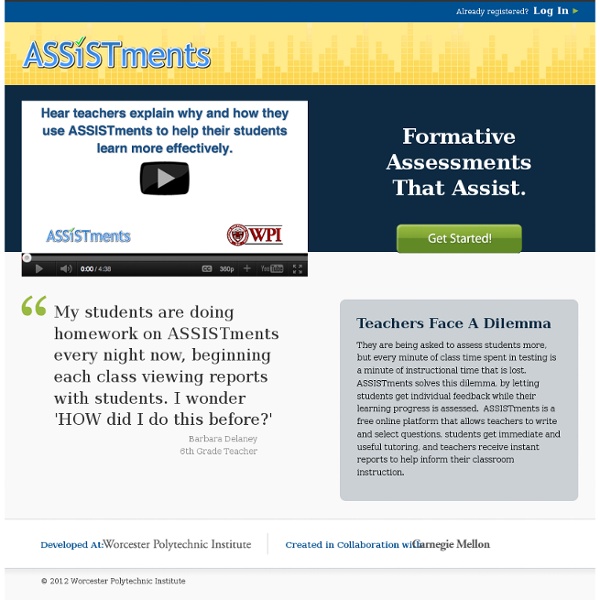



Collaborize Classroom | Online Education Technology for Teachers and Students Prodigy Math Game - Learn Math for Free. Forever. Cognitive Tutor Authoring Tools: Home WISE Home Page Java UpdateJan 15, 2014 On January 14, 2014, a new version of Java was released. Please update your computer to this version to continue using simulations and probes in WISE. WISE Image AnnotatorFeb 27, 2013 Check out the new WISE image annotator. Java UpdateFeb 20, 2013 For OS X 10.7 (mountain lion), typically Mac machines sold in 2011 and later, a security update will require you to reinstall the Java applet plugin to run many of the WISE4 projects. WISE in SpanishFeb 14, 2013 WISE is collaborating with a group in Argentina to create versions of all our activities in Spanish. WISE 4.6 is released! A stable release of WISE v4.6 is now available for download from WISE Server DowntimeOct 15, 2012 The WISE server will be down for maintenance on Saturday October 20th from 6:00 PM to 11:00 PM PDT. WISE included in STEMworks DatabaseAug 17, 2012 WISE Book ReviewAug 17, 2012 WISE research highlighted by NSTAJun 27, 2012 June 2012 workshopJun 27, 2012 WISE4.5 is released! New Design!
theLearnia - Learn with your friends HUGIN EXPERT - Advanced Decision Support using Bayesian Networks and Influence Diagrams The Differentiator Try Respondo! → ← Back to Byrdseed.com The Differentiator The Differentiator is based on Bloom's Taxonomy, Kaplan and Gould's Depth and Complexity, and David Chung's product menu. Try It In: French Dutch • Tweet It • Like Byrdseed • Pin It Students will judge the ethics of the [click to edit] using a textbook and create an essay in groups of three. Revised Bloom's Taxonomy adapted from "A Taxonomy for Learning,Teaching, and Assessing: A Revision of Bloom's Taxonomy of Educational Objectives" by Anderson and Krathwohl Depth and Complexity adapted from The Flip Book by Sandra N. Depth Big Idea Unanswered Questions Ethics Patterns Rules Language of the Discipline Essential Details Trends Complexity Multiple Points Of View Change Over Time Across the Disciplines Imperatives Origin Convergence Parallels Paradox Contribution Key Words Consequences Motivations Implications Significance Adapted from David Chung and The Flip Book, Too by Sandra N. Group Size One Two Three Four
Ponder What everyone reads. What I read. What is Ponder? Ponder is a browser add-on and iOS app. A Ponder micro-response consists of 3 parts: Extraction. Ponder micro-responses are shared through a Class Feed that aggregates class activity by topic area, student reactions (Sentiments) and course concepts (Themes). What is it for? Every learning tool has baked into it a set of assumptions and biases. Students are more engaged if they have a say in what they’re engaging with. Yes Ponder is a browser add-on which allows students to create Ponder “micro responses” on any web page, but at its heart, Ponder is also a fun way to read. With Ponder, teachers can give students reading assignments as specific as “Read this text to identify and respond to the arguments in support of the thesis statement.” or as open-ended as “Find examples of insincere apologies in the news.” Who is Ponder for? Teachers looking for new ways to scaffold the critical reading process and seed classroom discussion. In a word, no.
home - easygenerator 48 Ultra-Cool Summer Sites for Kids and Teachers A good majority of northern hemisphere and international schools are winding down the 2011-12 school year, and doors will be closing as the students and teachers take off on their summer adventures. Here is a list of great sites for kids and teachers to keep you happily productive and learning this summer. These are in no way in any order of personal preference or coolness. Happy summer! 1) Magic Tree House If your students like The Magic Tree House series (and let's be honest, who doesn't?) 2) Toporopa Can't afford that summer vacation schlepping around Europe? 3) ReadWriteThink Printing Press ReadWriteThink creates a lot of great educational resources. 4) Spell With Flickr Spell With Flickr is a simple site that allows you to enter any word, and will then create a photo representation of that word using pictures from Flickr. 5) Freeology 6) Tagxedo Tagxedo is a Wordle-esque site that allows students to create beautiful word clouds. 7) Learn Your Tables 8) Virtual Sistine Chapel 9) Cool Math